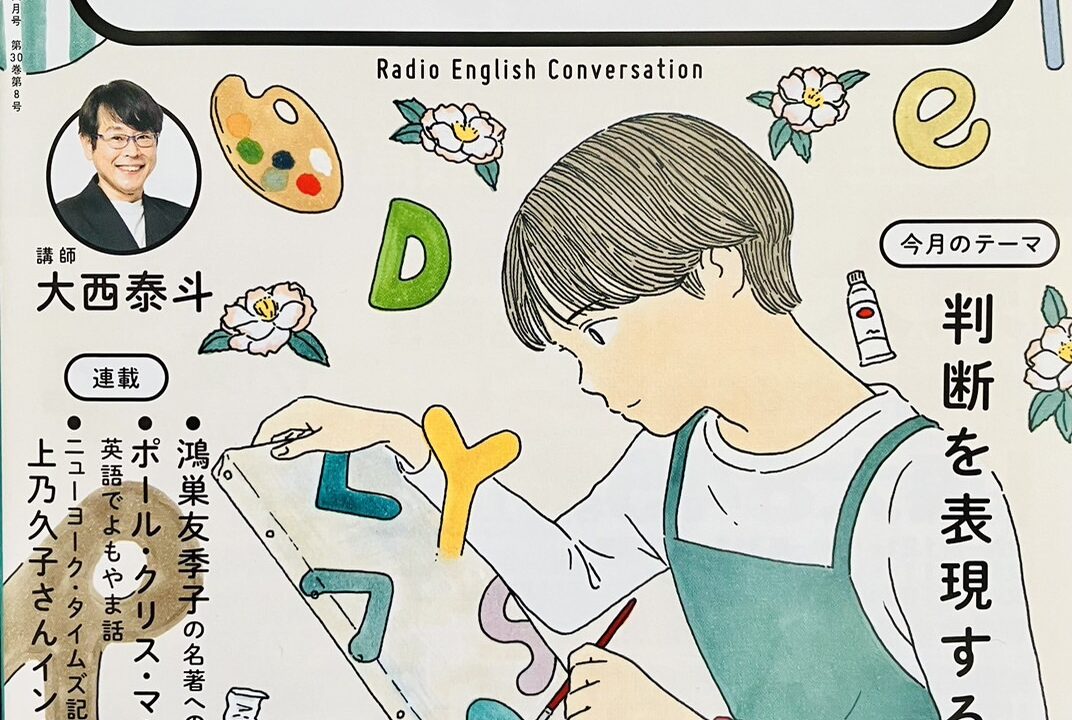【ラジオ英会話】Lesson 149 発言タイプ:正誤判断②間違いであることを伝える・判断を避ける – November 16 Thursday, 2023

November 16 Thursday, 2023
Lesson 149 発言タイプ:正誤判断②間違いであることを伝える・判断を避ける
☆Words & Phrases
Oh, Professor Peacock, it’s been ages. You must have been busy. – Jessica, hello. You can say that again.
**flame:
So, you married your old flame.
Congratulations. I’m so happy for you.
**How are things (going) with you?:
Anyway, enough about me. How are things with you?
**ruins
I’m going to visit the famous ruins.
**Göbekli Tepe:
Do you mean Göbekli Tepe in Turkey?

☆Grammar and Vocabulary
① It’s been ages.
現在完了形
しばらくぶりに出会った相手への定型あいさつ表現の一つ。現在完了形のイメージは「(今に)迫ってくる」なので、視線が、最後に会ったときから今に向けて「迫ってくる」意識
② You must have been busy.
助動詞+完了形
「助動詞+完了形」 は、助動詞の意味合いと完了形の「そのときまでに」の意識の組み合わせ
must have + 過去分詞「~だったにちがいない」
それまでの出来事について現在確信していることを表している
友だち追加でLINEにラジオ英会話で学んだフレーズを実際のビジネスシーンで使うための方法、そして放送のまとめが届きます。
☆Typical Expressions
That’s not exactly right.
相手が正しくないことを伝えるのは難しいもの。なぜなら、相手の気分を害さないよう配慮する必要があるため
この文では「not + 強い表現」のコンビネーションを使い、語気を和らげている
exactly right 「正確に・まさに正しい」
それを not で否定し、
not exactly right「必ずしも正しくはない」
That’s wrong.(それは間違いです)より、はるかに耳に優しい表現となっている
① That’s not quite right.
That’s not exactly right.
I don’t think that’s correct.
I’m afraid I don’t agree with that.
→「正しくない」のやわらかい表現。
not quite right は 「not + 強い表現」で、quite right(まったく正しい)というわけではない、ということ
② I wouldn’t say that.
would が条件「私なら」を含み「(私なら)そうは言わないでしょう」としている。直接「間違いだ」と言わないための工夫
③ There’s no clear-cut answer here.
I’m not ready to cast my vote on that.
I haven’t taken a side on that yet.
→ 正誤判断ができないときには、その旨を伝えること
clear-cut
cast my vote
take a side
★Practice
D: All right. It’s time for today’s practice. Most people don’t want to be confrontational. They prefer to be non-confrontational. Today’s phrases practice being indirect of or soft about disagreeing with someone.
**confrontational:
R: Great explanation, David.
D: Okay. Here we go,
– That’s not quite right.
– That’s not exactly right.
– I don’t think that’s correct.
And one more,
– I’m afraid I don’t agree with that.
R: Let’s continue,
– I wouldn’t say that.
Now for this one, be sure to emphasize the “that”. Let’s try it again together,
– I wouldn’t say that.
D: Great work. Sometimes there’s more than one answer. These phrases will help you express that. Here we go,
– There’s no clear-cut answer here.
– I’m not ready to cast my vote on that.
And one more,
– I haven’t taken a side on that yet.
All right. Let’s go one more time,
– I haven’t taken a side on that yet.
Great job, everyone!
R: I’m afraid I don’t agree with that, David.
D: Really? Why not?
R: ‘cause I think everyone did absolutely fantastic!
D: Ah ~, I can get on board with that.
☆Typical Expressions in Action
①それは必ずしも正しくはありません。私はワシントンの大学に行きましたが、そこの出身ではありません。
②それが正しいとは思いません。その情報をどこで手に入れましたか?
③私ならそうは言わないでしょう。ええ、彼は経験がありませんが、仕事に不向きなわけではありません。
**inexperienced:
**unfit:
★Ending
O: Oh! That’s not exactly right.
D: Yeah, Roza. I think you’re missing “at all”.
D: There you go.
O: Ah ~, you’re being confrontational!
November 16 Thursday, 2023
Lesson 149 発言タイプ:正誤判断②間違いであることを伝える・判断を避ける
(日本語訳・解説付き)
☆Words & Phrases
Oh, Professor Peacock, it’s been ages. You must have been busy. – Jessica, hello. You can say that again.
まあ、ピーコック教授、お久しぶりです。あなたは忙しかったに違いありません。 – ジェシカ、こんにちは。全くその通りです。
※ You can say that again. は、しみじみとした同意、を表します!
**flame: 恋人
So, you married your old flame.
それで、あなたは昔の恋人と結婚したのですね。
※ ○marry you を ✖ marry with you ~ とするのは間違いなので注意です!
※ Why does “flame” mean “sweetheart”?
D: Oh, in English, we compare “romance” to “fire” quite often.
R: Yeah, so oftentimes you’ll hear people say “My heart burns for you”. So “flame” is a very appropriate image.
Congratulations. I’m so happy for you.
おめでとうございます。私もとてもうれしく思っています。
※ Congratulations は必ず複数形です。「おめでとうがいっぱい」というイメージです!
※ I’m so happy for you. 難しいフレーズではありませんが、スラっと口から出てくるように練習しておきましょう!
**How are things (going) with you?: あなたの状況はどうですか?
※相手の調子を聞くとてもよく使われる表現です
Anyway, enough about me. How are things with you?
ところで、私のことはもう十分です=もういいでしょう。あなたの方はどのような調子ですか?
**ruins 遺跡
I’m going to visit the famous ruins.
私は有名な遺跡を訪れることになっています。
**Göbekli Tepe: ギョベクリテペ(トルコにある巨大な石柱が立ち並ぶ遺跡)
Do you mean Göbekli Tepe in Turkey?
それはトルコにあるギョデクリ・テペのことですか?

☆Grammar and Vocabulary
① It’s been ages.
お久しぶりです。
現在完了形
しばらくぶりに出会った相手への定型あいさつ表現の一つ。現在完了形のイメージは「(今に)迫ってくる」なので、視線が、最後に会ったときから今に向けて「迫ってくる」意識
② You must have been busy.
あなたは忙しかったにちがいありません。
助動詞+完了形
「助動詞+完了形」 は、助動詞の意味合いと完了形の「そのときまでに」の意識の組み合わせ
must have + 過去分詞「~だったにちがいない」
それまでの出来事について現在確信していることを表している
友だち追加でLINEにラジオ英会話で学んだフレーズを実際のビジネスシーンで使うための方法、そして放送のまとめが届きます。
☆Typical Expressions
That’s not exactly right.
それは必ずしも正しくはありません。
相手が正しくないことを伝えるのは難しいもの。なぜなら、相手の気分を害さないよう配慮する必要があるため
この文では「not + 強い表現」のコンビネーションを使い、語気を和らげている
exactly right 「正確に・まさに正しい」
それを not で否定し、
not exactly right「必ずしも正しくはない」
That’s wrong.(それは間違いです)より、はるかに耳に優しい表現となっている
① That’s not quite right.
That’s not exactly right.
それはまったく正しいとは言えません
I don’t think that’s correct.
それが正しいとは思いません
I’m afraid I don’t agree with that.
残念ながら、 それには同意できません
→「正しくない」のやわらかい表現。
not quite right は 「not + 強い表現」で、quite right(まったく正しい)というわけではない、ということ
② I wouldn’t say that.
私ならそうは言わないでしょう
would が条件「私なら」を含み「(私なら)そうは言わないでしょう」としている。直接「間違いだ」と言わないための工夫
③ There’s no clear-cut answer here.
ここに明確な答えはありません
I’m not ready to cast my vote on that.
それについて票を投じる準備はできていません
I haven’t taken a side on that yet.
それについてどちらの側につくのかまだ決めていません
→ 正誤判断ができないときには、その旨を伝えること
clear-cut は「明確な」
cast my vote は「投票する」
take a side は 「どちらか一方の側につく」
★Practice
D: All right. It’s time for today’s practice. Most people don’t want to be confrontational. They prefer to be non-confrontational. Today’s phrases practice being indirect of or soft about disagreeing with someone.
**confrontational: 対決を辞さない、対立的な
R: Great explanation, David.
D: Okay. Here we go,
– That’s not quite right.
– That’s not exactly right.
– I don’t think that’s correct.
And one more,
– I’m afraid I don’t agree with that.
R: Let’s continue,
– I wouldn’t say that.
Now for this one, be sure to emphasize the “that”. Let’s try it again together,
– I wouldn’t say that.
D: Great work. Sometimes there’s more than one answer. These phrases will help you express that. Here we go,
– There’s no clear-cut answer here.
– I’m not ready to cast my vote on that.
And one more,
– I haven’t taken a side on that yet.
All right. Let’s go one more time,
– I haven’t taken a side on that yet.
Great job, everyone!
R: I’m afraid I don’t agree with that, David.
D: Really? Why not?
R: ‘cause I think everyone did absolutely fantastic!
D: Ah ~, I can get on board with that.
☆Typical Expressions in Action
①それは必ずしも正しくはありません。私はワシントンの大学に行きましたが、そこの出身ではありません。
That’s not exactly right. I went to college in Washington, but I’m not from there.
②それが正しいとは思いません。その情報をどこで手に入れましたか?
I don’t think that’s correct. Where did you get that info?
「それは間違っている」 と言うより、「それが正しいとは思わない」 のほうがやわらかく響きますよ。
③私ならそうは言わないでしょう。ええ、彼は経験がありませんが、仕事に不向きなわけではありません。
I wouldn’t say that. Yes, he’s inexperienced, but he’s not unfit for his job.
**inexperienced: 経験不足
**unfit: ピッタリしていない
★Ending
O: Oh! That’s not exactly right.
D: Yeah, Roza. I think you’re missing “at all”.
D: There you go.
O: Ah ~, you’re being confrontational!
名古屋駅前にあるビジネス英語&仕事での英語雑談力をつけるための「名古屋BEGビジネス英会話ジム」
営業時間:平日 9:00~22:00 土曜日 9:00~19:00(日祝休み)
〒450-0002 愛知県名古屋市中村区名駅2丁目40-16 名駅野村ビル 5階


